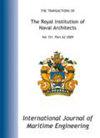自主水下航行器航向和深度姿态自适应模糊分数阶pid控制器设计
IF 0.6
4区 工程技术
Q4 ENGINEERING, MARINE
引用次数: 4
摘要
为了提高传统PID控制器的暂态和稳态性能,本文设计了一种基于非线性MIMO结构的新型自校正模糊分数阶PID控制器。当高度非线性过程的影响,如高度机动、参数变化,必须在存在传感器噪声和波浪扰动的情况下进行控制时,这是特别有利的。AUV的控制是至关重要的,因为其复杂性和高度耦合的动力学、时间变化和水动力学建模的困难。通过运动学和动力学方程,建立了AUV的综合非线性模型。所提出的AFFOPID控制器的比例因子在不同的水下条件下进行在线调整。将自适应模糊方法与PID控制器相结合,可以更好地解决PID参数和AUV参数不确定性的挑战。仿真结果表明,所开发的控制系统具有足够的稳定性、能力和效率,能够稳定、可控地控制AUV的路径跟随。结果表明,与传统的PID调节控制器相比,该控制器具有良好的性能和显著的鲁棒稳定性。本文章由计算机程序翻译,如有差异,请以英文原文为准。
DESIGN OF ADAPTIVE FUZZY FRACTIONAL ORDER PID CONTROLLER FOR AUTONOMOUS UNDERWATER VEHICLE (AUV) IN HEADING AND DEPTH ATTITUDES
This paper deals with the design of new self-tuning Fuzzy Fractional Order PID (AFFOPID) controller based on nonlinear MIMO structure for an AUV in order to enhance the performance in both transient state and steady state of traditional PID controller. It is particularly advantageous when the effects of highly nonlinear processes, like high maneuver, parameters variation, have to be controlled in presence of sensor noises and wave disturbances. Aspects of AUV controlling are crucial because of Complexity and highly coupled dynamics, time variety and difficulty in hydrodynamic modeling. In this try, the comprehensive nonlinear model of AUV is derived through kinematics and dynamic equations. The scaling factor of the proposed AFFOPID Controller is adjusted online at different underwater conditions. Combination of adaptive fuzzy methods and PID controllers can enhance solving the uncertainty challenge in the PID parameters and AUV parameter uncertainty. The simulation results show that developed control system is stable, competent and efficient enough to control the AUV in path following with stabilized and controlled speed. Obtained results demonstrate that the proposed controller has good performance and significant robust stability in comparison to traditional tuned PID controllers.
求助全文
通过发布文献求助,成功后即可免费获取论文全文。
去求助
来源期刊

International Journal of Maritime Engineering
ENGINEERING, MARINE-
CiteScore
1.20
自引率
0.00%
发文量
18
审稿时长
>12 weeks
期刊介绍:
The International Journal of Maritime Engineering (IJME) provides a forum for the reporting and discussion on technical and scientific issues associated with the design and construction of commercial marine vessels . Contributions in the form of papers and notes, together with discussion on published papers are welcomed.
 求助内容:
求助内容: 应助结果提醒方式:
应助结果提醒方式:


